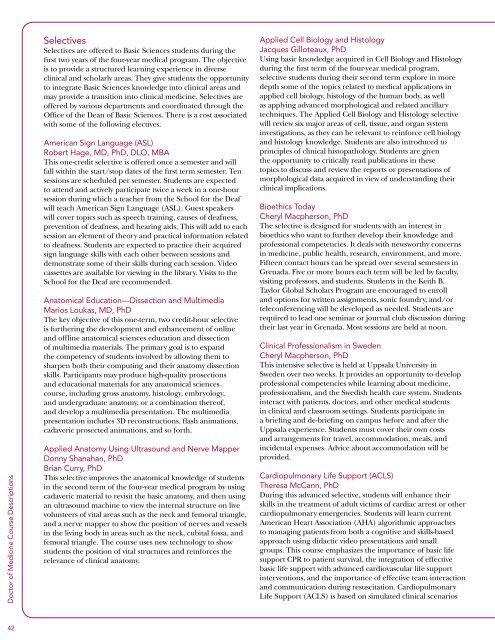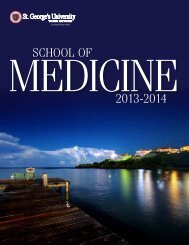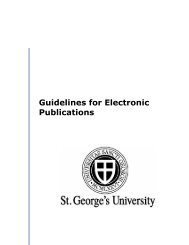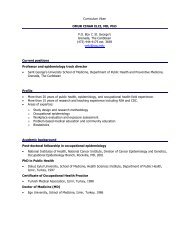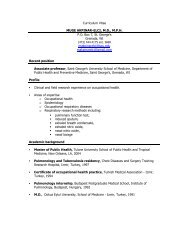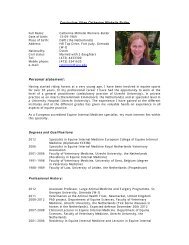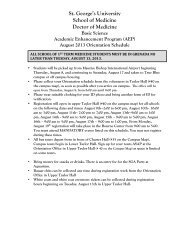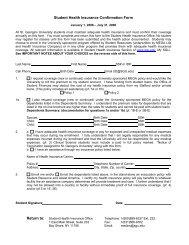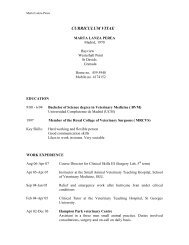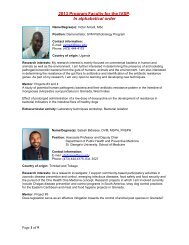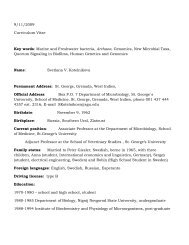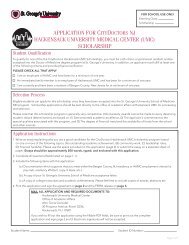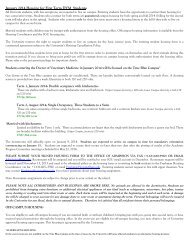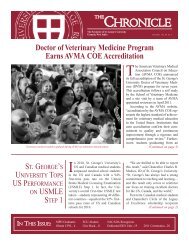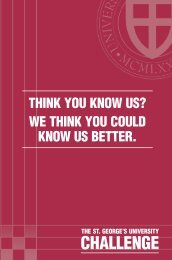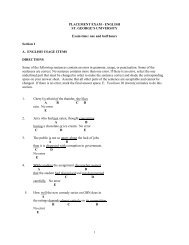ST. GEORGE'S UNIVERSITY ⢠School of Medicine 2010-2011
ST. GEORGE'S UNIVERSITY ⢠School of Medicine 2010-2011
ST. GEORGE'S UNIVERSITY ⢠School of Medicine 2010-2011
You also want an ePaper? Increase the reach of your titles
YUMPU automatically turns print PDFs into web optimized ePapers that Google loves.
Doctor <strong>of</strong> <strong>Medicine</strong> Course Descriptions<br />
Selectives<br />
Selectives are <strong>of</strong>fered to Basic Sciences students during the<br />
first two years <strong>of</strong> the four-year medical program. The objective<br />
is to provide a structured learning experience in diverse<br />
clinical and scholarly areas. They give students the opportunity<br />
to integrate Basic Sciences knowledge into clinical areas and<br />
may provide a transition into clinical medicine. Selectives are<br />
<strong>of</strong>fered by various departments and coordinated through the<br />
Office <strong>of</strong> the Dean <strong>of</strong> Basic Sciences. There is a cost associated<br />
with some <strong>of</strong> the following electives.<br />
American Sign Language (ASL)<br />
Robert Hage, MD, PhD, DLO, MBA<br />
This one-credit selective is <strong>of</strong>fered once a semester and will<br />
fall within the start/stop dates <strong>of</strong> the first term semester. Ten<br />
sessions are scheduled per semester. Students are expected<br />
to attend and actively participate twice a week in a one-hour<br />
session during which a teacher from the <strong>School</strong> for the Deaf<br />
will teach American Sign Language (ASL). Guest speakers<br />
will cover topics such as speech training, causes <strong>of</strong> deafness,<br />
prevention <strong>of</strong> deafness, and hearing aids. This will add to each<br />
session an element <strong>of</strong> theory and practical information related<br />
to deafness. Students are expected to practice their acquired<br />
sign language skills with each other between sessions and<br />
demonstrate some <strong>of</strong> their skills during each session. Video<br />
cassettes are available for viewing in the library. Visits to the<br />
<strong>School</strong> for the Deaf are recommended.<br />
Anatomical Education—Dissection and Multimedia<br />
Marios Loukas, MD, PhD<br />
The key objective <strong>of</strong> this one-term, two credit-hour selective<br />
is furthering the development and enhancement <strong>of</strong> online<br />
and <strong>of</strong>fline anatomical sciences education and dissection<br />
<strong>of</strong> multimedia materials. The primary goal is to expand<br />
the competency <strong>of</strong> students involved by allowing them to<br />
sharpen both their computing and their anatomy dissection<br />
skills. Participants may produce high-quality prosections<br />
and educational materials for any anatomical sciences<br />
course, including gross anatomy, histology, embryology,<br />
and undergraduate anatomy, or a combination there<strong>of</strong>,<br />
and develop a multimedia presentation. The multimedia<br />
presentation includes 3D reconstructions, flash animations,<br />
cadaveric prosected animations, and so forth.<br />
Applied Anatomy Using Ultrasound and Nerve Mapper<br />
Donny Shanahan, PhD<br />
Brian Curry, PhD<br />
This selective improves the anatomical knowledge <strong>of</strong> students<br />
in the second term <strong>of</strong> the four-year medical program by using<br />
cadaveric material to revisit the basic anatomy, and then using<br />
an ultrasound machine to view the internal structure on live<br />
volunteers <strong>of</strong> vital areas such as the neck and femoral triangle,<br />
and a nerve mapper to show the position <strong>of</strong> nerves and vessels<br />
in the living body in areas such as the neck, cubital fossa, and<br />
femoral triangle. The course uses new technology to show<br />
students the position <strong>of</strong> vital structures and reinforces the<br />
relevance <strong>of</strong> clinical anatomy.<br />
Applied Cell Biology and Histology<br />
Jacques Gilloteaux, PhD<br />
Using basic knowledge acquired in Cell Biology and Histology<br />
during the first term <strong>of</strong> the four-year medical program,<br />
selective students during their second term explore in more<br />
depth some <strong>of</strong> the topics related to medical applications in<br />
applied cell biology, histology <strong>of</strong> the human body, as well<br />
as applying advanced morphological and related ancillary<br />
techniques. The Applied Cell Biology and Histology selective<br />
will review six major areas <strong>of</strong> cell, tissue, and organ system<br />
investigations, as they can be relevant to reinforce cell biology<br />
and histology knowledge. Students are also introduced to<br />
principles <strong>of</strong> clinical histopathology. Students are given<br />
the opportunity to critically read publications in these<br />
topics to discuss and review the reports or presentations <strong>of</strong><br />
morphological data acquired in view <strong>of</strong> understanding their<br />
clinical implications.<br />
Bioethics Today<br />
Cheryl Macpherson, PhD<br />
The selective is designed for students with an interest in<br />
bioethics who want to further develop their knowledge and<br />
pr<strong>of</strong>essional competencies. It deals with newsworthy concerns<br />
in medicine, public health, research, environment, and more.<br />
Fifteen contact hours can be spread over several semesters in<br />
Grenada. Five or more hours each term will be led by faculty,<br />
visiting pr<strong>of</strong>essors, and students. Students in the Keith B.<br />
Taylor Global Scholars Program are encouraged to enroll<br />
and options for written assignments, sonic foundry, and/or<br />
teleconferencing will be developed as needed. Students are<br />
required to lead one seminar or journal club discussion during<br />
their last year in Grenada. Most sessions are held at noon.<br />
Clinical Pr<strong>of</strong>essionalism in Sweden<br />
Cheryl Macpherson, PhD<br />
This intensive selective is held at Uppsala University in<br />
Sweden over two weeks. It provides an opportunity to develop<br />
pr<strong>of</strong>essional competencies while learning about medicine,<br />
pr<strong>of</strong>essionalism, and the Swedish health care system. Students<br />
interact with patients, doctors, and other medical students<br />
in clinical and classroom settings. Students participate in<br />
a briefing and de-briefing on campus before and after the<br />
Uppsala experience. Students must cover their own costs<br />
and arrangements for travel, accommodation, meals, and<br />
incidental expenses. Advice about accommodation will be<br />
provided.<br />
Cardiopulmonary Life Support (ACLS)<br />
Theresa McCann, PhD<br />
During this advanced selective, students will enhance their<br />
skills in the treatment <strong>of</strong> adult victims <strong>of</strong> cardiac arrest or other<br />
cardiopulmonary emergencies. Students will learn current<br />
American Heart Association (AHA) algorithmic approaches<br />
to managing patients from both a cognitive and skills-based<br />
approach using didactic video presentations and small<br />
groups. This course emphasizes the importance <strong>of</strong> basic life<br />
support CPR to patient survival, the integration <strong>of</strong> effective<br />
basic life support with advanced cardiovascular life support<br />
interventions, and the importance <strong>of</strong> effective team interaction<br />
and communication during resuscitation. Cardiopulmonary<br />
Life Support (ACLS) is based on simulated clinical scenarios<br />
42


